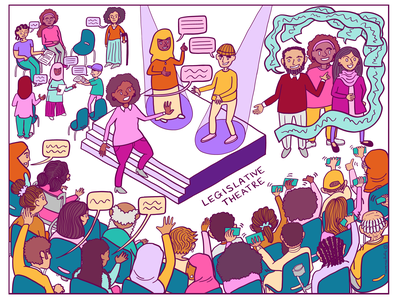There isn’t one solution to ending homelessness and the sector is constantly evolving and responding to ever-changing needs and environments. One of Homeless Link's core roles is to identify and platform innovation in the homelessness sector. In June, we interviewed Samra Said, Co-Director of Arts and Homelessness International, and Katy Rubin, Legislative Theatre Practitioner and Creative Civic Strategist about the practice of Legislative Theatre and the joy of co-creation.
-

Watch
an original play based on community members’ lived experiences and problems. -

Act
on stage to intervene in the play and test ways to address the problems presented. -

Propose
policy changes to address the problems, and deliberate together with policymakers. -

Vote
on the policy proposals that emerge from the plays, and make collective commitments to action.
Although, that’s just what happens on the day of the performance, and Samra and Katy explained that there is much more to it.
Before the performance
In the UK, this usually starts with conversations and mapping exercises with a local authority. Following this, equal numbers of actors with lived experience and homelessness/local authority staff are identified, debriefed and engaged. The rehearsals begin and depending on the size and timeline of the project, this can last from a couple of hours to 6+ months.
Performance day
On performance day, it’s as you’d expect from any play – a stage, a set with props, the actors facing out onto the audience. But the difference with Legislative Theatre is that the audience is made up of people with lived experience alongside policy-makers and budget holders. These stakeholders are part of both the performance and the audience. This allows them to explore different scenarios, test out ideas and unearth solutions. Together, and carefully facilitated by the session lead, they explore possibilities, make proposals and acknowledge limitations.
Actions
Following these rigorous discussions, commitments are made, written down and taken away for action. And it doesn’t end there, Legislative Theatre continues way beyond the performance, sometimes for years afterwards, supporting and holding to account the commitments which are made.
How has legislative theatre been applied to the UK and homelessness sector?
Growing popularity
Over the last five years or so, Legislative Theatre has grown in popularity, particularly in the homelessness sector. Samra and Katy explained that there has been work with several local authorities, including Greater Manchester Combined Authority, Coventry, Haringey, Medway and most recently, Wolverhampton. The performances and subsequent work have focussed on a range of issues faced by people experiencing homelessness, from outreach practices and verification processes to temporary accommodation and the creation of full strategies.
Flexibility of the method
A recent performance with Medway Council was reported by Inside Housing and the latest session with Wolverhampton shows the flexibility of the method, with a scaled down version of the above process contained within one day.
Dedicated training
With a growing interest in Legislative Theatre, capacity for facilitation has been recently increased through a dedicated training programme. There are now a community of facilitators in Edinburgh, Newcastle, Coventry and beyond.
Does Legislative Theatre really change policy?
In short, yes. There are some impressive outcomes from performances across the country, including:
Greater Manchester Prevention Strategy – all 23 proposals from Legislative Theatre were included, such as involving people with lived experience at management level at the GMCA.
This project won the 2022 award for Best Practice in Citizen Participation from the International Observatory on Participatory Democracy.
Other successes
Greater Manchester Housing First – a ‘no surprises’ policy was implemented ensuring that service users always know the staff member they are working with.
Coventry City Council – co-created their homelessness strategy and increased the involvement of people with lived experience, including paid members of staff.
Medway Council – in only a few months, there has been a significant shift in the rough sleeping verification process. This means that third sector organisations will now have an agreed process to follow, as well as a regular meetings with local authority staff. This will allow VCS organisations to have a clear understanding of what constitutes sleeping rough, as defined by DLUHC and Homeless Link, and they can then present details of people who may have not been seen by Outreach services. Using this evidence-based approach, verification can be agreed through a joint process.
What does the future look like for Legislative Theatre?
Legislative Theatre is a method of co-creation, but it is not, of course, the only method. What matters to Samra and Katy is not so much about the scaling-up of Legislative Theatre but that local authorities, and indeed central government, engage in the values of participatory policy making.
These values include equity, transparency, accountability, joyfulness, storytelling, power sharing, centring lived experience and building trust.
And building trust is the foundation of Legislative Theatre, created by developing a:
- Shared understanding of the problem (“all stakeholders deeply understand my experience of living the problem”)
- Shared experience of problem solving (“we’re getting our hands dirty together and learning about what does and doesn’t work”)
- Shared experience of risk and vulnerability (seeing it from each other’s perspective)
And creating this level of trust is why Legislative Theatre works to meaningfully co-produce strategy and policy.
“Legislative Theatre is happening. It works. And if you’re not involved, you’re lagging behind.”
If you’re interested in starting a Legislative Theatre journey, check out the resources and contact information below.



